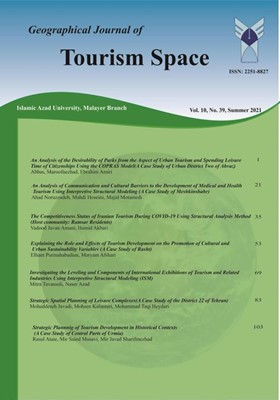The Competitiveness Status of Iranian Tourism during COVID-19 using Structural Analysis Method (Host community: Ramsar Residents)
Subject Areas :
Vadood Javan Amani
1
![]() ,
Hamid Akbari
2
,
Hamid Akbari
2
![]()
1 - Department of Business Administration, Islamic Azad University of Firuzkooh Branch
2 - Department of English Translation, Imam Reza International University of Mashhad.
Keywords: Structural analysis, Competitiveness, Corona virus, Tourism management,
Abstract :
One of the most recent crises facing the international community, including Iran, is the Corona virus. Due to its characteristics, this crisis is different from other crises and has affected the tourism industry much more than other crises. In this regard, the present article tries to identify and cluster the stimuli affecting the tourism competitiveness of Iran for the Corona period using the method of structural analysis. The purpose of this study is to investigate the attitude and behavior of the host community towards the presence of tourists during the outbreak of Covid-19 in the tourist destination. Integrated threat theory was used to shape the theoretical framework. Qualitative research method was statistical population, residents and judgmental sampling method and the number of statistical samples based on theoretical saturation was 21. Data were collected through semi-structured interviews. Data analysis was performed based on content analysis and open and centralized coding. Findings of the study presented new dimensions of host-tourist interaction in the Corona period based on the integration of theories of social exchange and integrated threat. The present article concludes that although the attitude of most people towards the presence of tourists in this period has been negative, but it can be accepted by emphasizing the dependence of livelihood and economy on tourism and conditional reception of tourists and at the same time the health of the people in the country given priority.
_||_


